#luther hughes
Photo

- Luther Hughes, Winter, Extended.
7K notes
·
View notes
Text

Luther Hughes, from “It Is February,” in A Shiver in the Leaves
2K notes
·
View notes
Text
“Stay Safe” - Luther Hughes
The dog outside won't stop swallowing the city
with its harping. Sooner or later some good citizen
will peek through their blinds asking themselves
about the fuss, wanting to know what cruel somebody
abandoned such loyalty—some Golden Retriever,
some snip-tailed Rottweiler, who knows. Next to me,
he is asleep, the one I love, the one who promised me
a dog in the long seasons to come. He says when the sun
is at its most weary, when the sky collapses into the Cascades,
when the wounds of autumn vanish into miles of snowy flesh,
then. The truth is, who knows what will happen to either of us.
We are always one bullet away from the graveyard,
a murder of memorial hymns. And if that's the room
we've been born into, why do sparrows break the morning with song?
Why do fir trees fight bark and root for their green?
Sometimes I hear the Earth's sunken voice saying,
Come home, come home. And who am I to argue with the one
who has given us so much? But dear eager Earth, I want him
to live forever. I want the dog outside to have met my dead dog.
I hardly think of him, of how our neighbors shouted at us to shut him up.
One day they did it for us, poured searing water onto his body.
The grass around him became shredded hairs. The flies fevered
and worried. I watched what happened to an animal unwelcomed,
underserved. When I tell him this as he armors himself for the day,
he says that will never happen again. Oh, to be as certain as wind!
Not true, I want to say, but I can't have everything. I can't
have the yellow from the small patch of dandelions, can't have
the echo of laughter rolling over rooftops, over the hush
of engines and bicycle bells, can't bring the dead back to life.
We won't live forever, but I am afraid some wrong citizen
will mistake him for a scar on the neighborhood—they will
take him from me. I settle with a covering spell: Stay safe.
He walks out the door and into a spray of sirens.
106 notes
·
View notes
Text
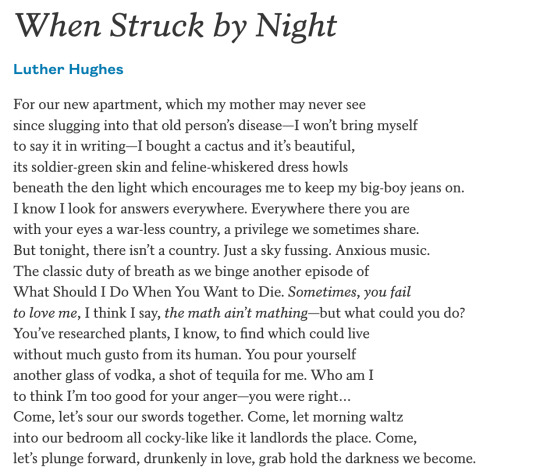
when struck by night by Luther Hughes
2 notes
·
View notes
Text
I wanted
so much of today
to be peaceful
but the empty crow
untethers
something in me: a feral
yearning for love
or a love that is so full
of power,
of tenderness,
the words
fall to their knees
begging for mercy
like tulips
in wind.
Luther Hughes, from Tenor, 2018
5 notes
·
View notes
Text
From Luther Hughes's book, A Shiver in the Leaves. (BOA Editions, 2022).

#poetry#poem#poets on tumblr#poetry books#poets corner#poems for these hours#poetry on tumblr#poems on tumblr#poem of the day#poems#luther hughes
1 note
·
View note
Text

stay safe - luther hughes
2 notes
·
View notes
Text
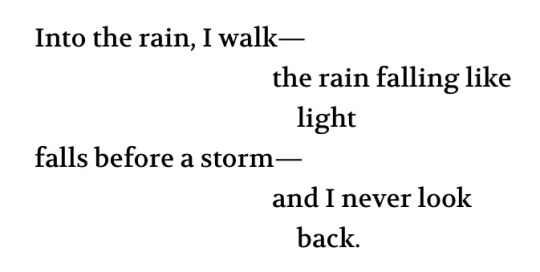
—Luther Hughes, from “Such Things Require Tenderness,” in A Shiver in the Leaves
1 note
·
View note
Text

— Luther Hughes, from “It Is February"
1 note
·
View note
Text
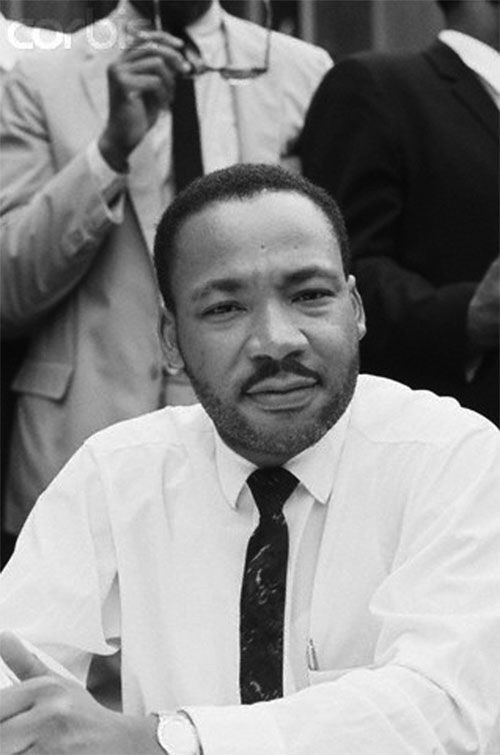
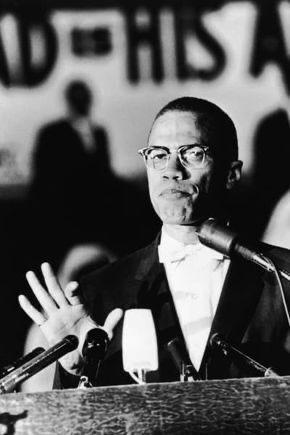
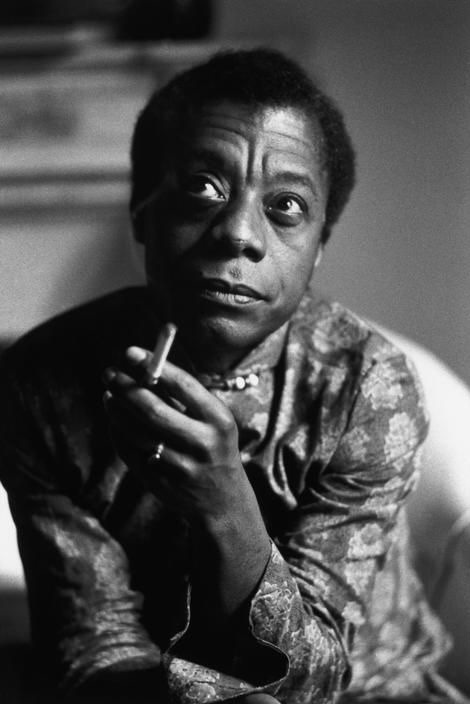



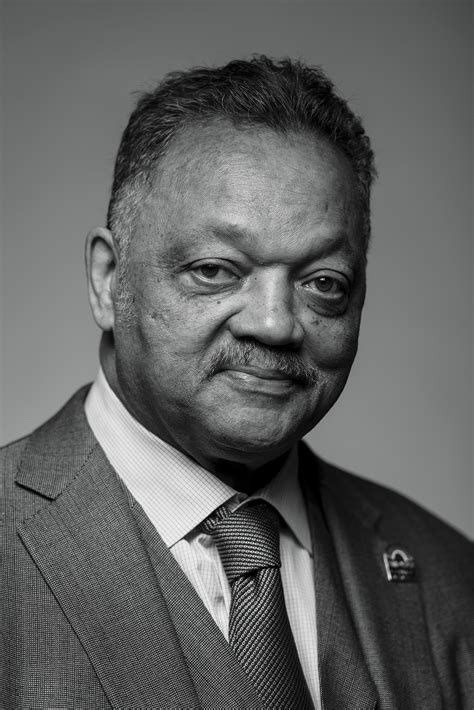

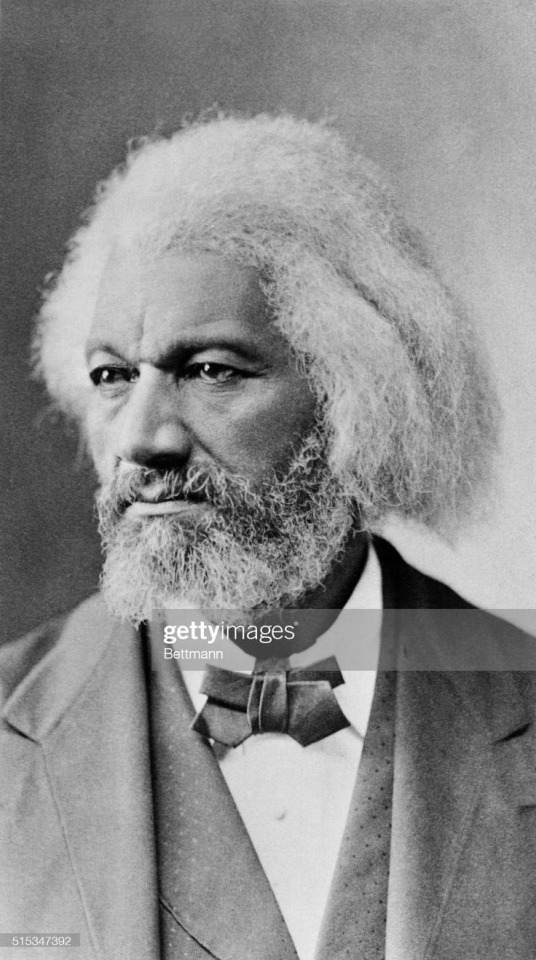
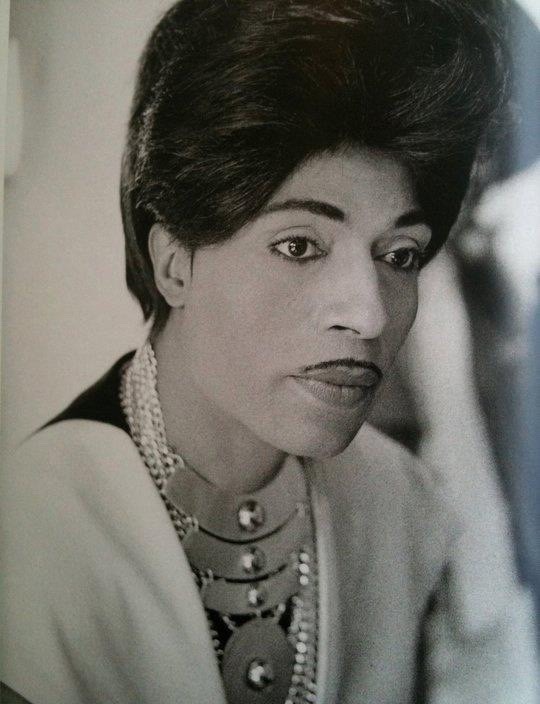
Happy Black History 🫶🏽
Couldn't forget our Beautiful Black Men
Their Names are presented below, In chronological order from top to bottom.
Martin Luther King ( Minister & Activist)
Malcolm X ( Minister & Activist)
James Baldwin ( Writer & Activist)
Langston Hughes ( Poet & Activist)
Thurgood Marshall ( Lawyer & Jurist)
Jackie Robinson ( Baseball player)
Jessie Jackson ( Minister & Activist)
W.E.B Dubois ( Activist, Author, & Historian)
Frederick Douglas (Writer)
Little Richard ( Singer & Pianist)
#black girls of tumblr#black girl blogger#pinterest#black boy aesthetic#black history month#james baldwin#martin luther king jr#malcolm x#langston hughes#thurgood marshall#jessie jackson#web du bois#jackie robinson#black history#loveing black men#black men magic#black men rule
138 notes
·
View notes
Text
By: Grayson Slover
Published: Feb 5, 2024
“This is a revolution to get in…Revolutions have been centered on destroying something. Whereas in this revolution the quest is for the Negro to get into the stream of American life.”
When Dr. Martin Luther King Jr. made the above observation in 1965, the Civil Rights Movement had just achieved two monumental victories in the “revolution to get in”: The Civil Rights Act of 1964, and the Voting Rights Act of 1965. It had also, however, been forced to reckon with events that suggested these legislative victories might not be enough. The day after the Voting Rights Act was signed into law, the Los Angeles neighborhood of Watts was decimated by riots sparked after a young black man, in the course of resisting arrest for drunk driving, was struck in the face with a police baton and the confrontation with onlookers escalated. Over the following four summers, similar racially-charged riots broke out in virtually every major northern city across the United States.
Meanwhile, Dr. King and the other leaders of the Civil Rights Movement were confronted with their first organized challenge for leadership of the movement against racism in America. In 1966, the truly revolutionary (and often violent) Black Power movement burst onto the scene, insisting that the goal of a harmonious and equal relationship between the races in America was a farce. According to them, what the Civil Rights Movement upheld as achievements were in fact trivial and superficial changes that served to maintain an indelibly white supremacist American government.
Despite all of this, the majority of black Americans remained convinced that MLK’s message was the right one. A 1968 study of fifteen northern cities showed that 72 percent of black northerners approved of Martin Luther King and just 5 percent disapproved of him. In the same study, the most well-known leader in the Black Power movement, Stokely Carmichael, received only a 14 percent approval rating and a 35 percent disapproval rating; more than a quarter of respondents had never heard of him. Similarly, a 1966 survey of black Americans found that a mere five percent approved of “Black Nationalism,” while 63 percent disapproved.
One might assume that the discourse around racial justice in America today, six decades later, would more closely resemble the philosophy of MLK than of Stokely Carmichael. If most black Americans were still supportive of Dr. King’s hopeful message of racial integration even during the tumultuous late 1960s, then surely they—and indeed most Americans of all races—would continue to support Dr. King’s dream today. Unfortunately, that is not the case, as author Coleman Hughes explains in his incisive new book The End of Race Politics: Arguments for a Colorblind America. In fact, in many parts of American society, the socially acceptable opinions on race today are strikingly similar to those of the Black Power movement that Dr. King fought so hard to oppose.
The simplest way to describe Hughes’ book is an unfortunately necessary defense of the philosophy and legacy of the Civil Rights movement, and Dr. King in particular. As Hughes points out, today’s self-described “anti-racists”—whom he calls “neoracists”—attempt to trade on the legacy of Dr. King while spurning his philosophy. They will misleadingly claim, without evidence, that Dr. King was a radical, and that his legacy has been, in Hughes’s words, “sanitized, co-opted, and weaponized by conservatives and moderates.” They try to decouple Dr. King’s ideas—which they dismiss outright as mischaracterizations by (white) conservatives and moderates—from Dr. King the historical figure, whose legacy is rightly untouchable in America today.
Take for example the concept of racial “colorblindness.” Today, we are hearing the term “colorblind” in the context of race to describe what critics deem the outdated and naive attitude that well-meaning but ignorant white people have toward people of different races—or worse, a smokescreen that racists use to mask their goal of maintaining white supremacy. In his book Racism without Racists: Color-blind Racism and the Persistence of Racial Inequality in America, law professor and critical race theorist Eduardo Bonilla-Silva defines “color-blind racism” as “a new racial ideology” that “explains [and justifies] contemporary racial inequality as the outcome of nonracial dynamics…the product of market dynamics, naturally occurring phenomena, and blacks’ imputed cultural limitations.”
The neoracists, like the Black Power activists decades ago—and, Hughes observes, like old-school white supremacists—believe that “race matters in a deep and enduring way.” They argue that the antidote to colorblind racism is “race-consciousness,” which they promote in every facet of life: from school admissions, to hiring practices, down to everyday interpersonal relationships. Failing to focus on race at all times and in every context, they claim, is to fail to recognize the racism that is ubiquitous in American society and baked into the foundation of all our institutions.
Yet Hughes reminds us that the colorblind approach to race that has become so controversial today is in truth what the heroes of the Civil Rights movement risked their lives fighting for. It is precisely what Dr. King promoted in his legendary “I Have a Dream” speech. Colorblindness, Hughes states simply, “is the philosophy that we should treat people—both in our private lives and in our public policy—without regard to race.” The colorblind approach is different from “not seeing color,” which Hughes correctly explains is a caricature that critics use to dismiss the idea as superficial and obtuse. Far from ignoring racism where it exists, Hughes aptly notes that the very concept of racism—defined as prejudice based on skin color—is meaningless unless it is measured against a standard of “race neutrality” or colorblindness.
The “real problem of racism in America,” Hughes tells us, is that “our society keeps failing to enshrine colorblindness as its guiding ethos.” Starting from the founding of this nation, through the inadequacies of Reconstruction, but also to the systematic restructuring of public policy to take undue account of the race, color, and national origin of individuals that ensued after the passage of the Civil Rights Act of 1964—which expressly prohibited the drawing of such distinctions between individuals—all the way to today, our leaders have consistently chosen to turn away from the ideal of treating individuals as individuals rather than members of racial or ethnic groups. To finally solve this problem, Hughes proposes that we “embrace our common humanity and the colorblind philosophy that follows from it. We need to embody that philosophy in race neutral public policies. And we need to strive to ensure that our personal relationships don’t get infected with toxic race thinking of any sort.”
The most illustrative difference between the neoracists and what could be called the “real antiracists” (the advocates of colorblindness) is the type of society they wish to create. We can leave aside for now good-faith disagreements on how big of a problem racism still is in America, or on how close we are to reaching that ideal society. What truly separates the two camps is what each thinks the ideal society should be. For the colorblindness advocates, we wish to live in a society where racial differences have ceased to carry any social or political meaning; a society in which racial differences are treated the same way as we treat differences in hair color today, to borrow a line from Sam Harris. The neoracists, on the other hand, believe that it is either impossible or undesirable for a society to transcend racial differences. According to them, race will always be a central and determinative feature of any society and in the lives of individuals within that society.
When the two philosophies are compared in this way, I believe that the vast majority of Americans still instinctively align with the optimistic goals of colorblindness. Like Dr. King and the other liberal Civil Rights leaders, they are eager allies in the “revolution to get in,” to extend the promise of America to all of the people who have historically been excluded from it. The hopeless worldview of the neoracists and traditional racial supremacists alike is bound to fail if people are able to understand and recognize the ideas that comprise it. To bring about the ideal colorblind society will be a challenge, but it’s a challenge worth the effort, and The End of Race Politics provides a compelling blueprint for taking it on.
#Grayson Slover#Coleman Hughes#colorblindness#colorblind#color blindness#color blind#antiracism#antiracism as religion#neoracism#Dr. Martin Luther King Jr#Martin Luther King Jr#MLK Jr#Civil Rights Movement#racism#religion is a mental illness
2 notes
·
View notes
Photo

- Luther Hughes, Tenor.
1K notes
·
View notes
Text

the new luther hughes poem is INSANE [ID in alt text]
639 notes
·
View notes
Link

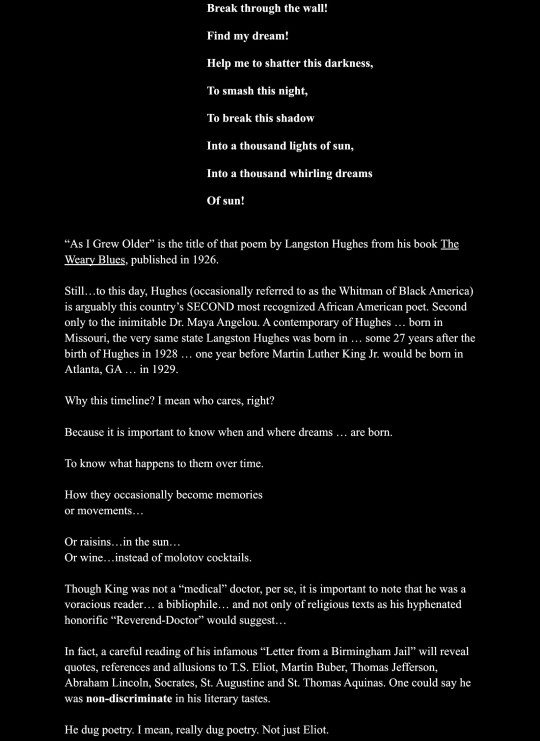

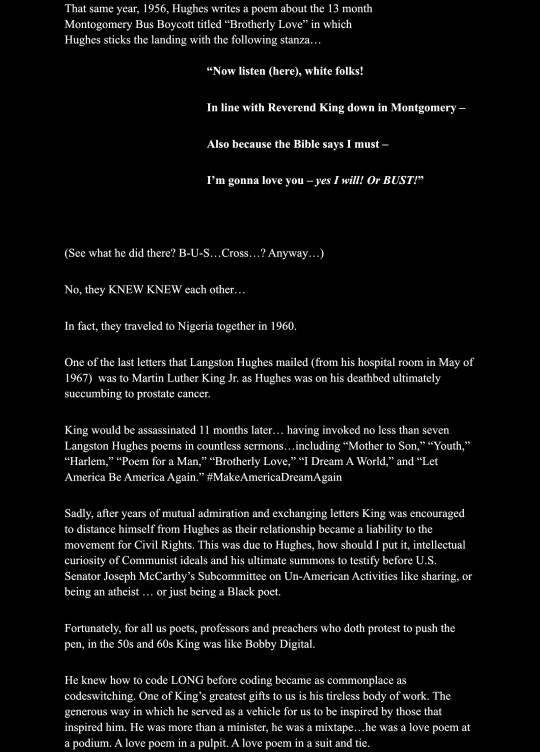
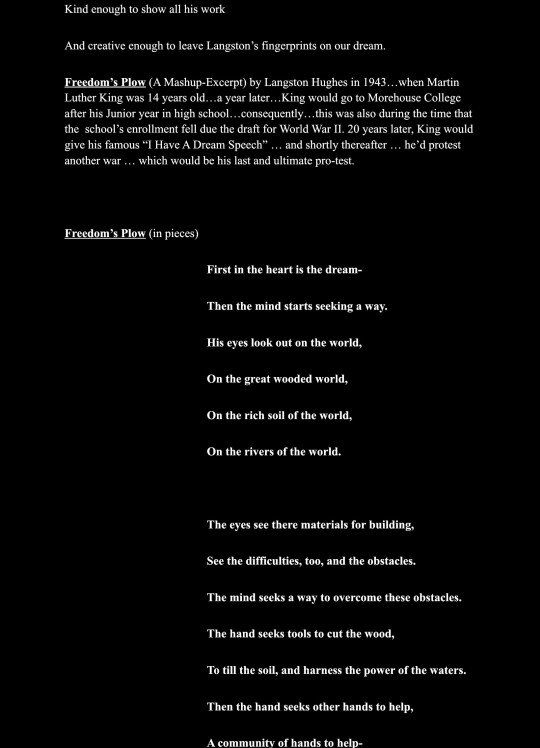


References
Smithsonian Magazine https://www.smithsonianmag.com/history/in-his-speeches-MLK-carefully-evoked-poetry-langston-hughes-180968655/
Stanford University https://kinginstitute.stanford.edu/king-papers/documents/langston-hughes
The Florida Bookshelf (W. Jason Miller) https://floridapress.blog/2015/01/19/guest-post-how-the-poetry-of-langston-hughes-inspired-martin-luther-kings-first-dream/
Tracing The Path https://podcasts.google.com/feed/aHR0cHM6Ly90cmFjaW5ndGhlcGF0aC5wb2RvbWF0aWMuY29tL3JzczIueG1s/episode/aHR0cHM6Ly90cmFjaW5ndGhlcGF0aC5wb2RvbWF0aWMuY29tL2VudHJ5LzIwMjItMDItMjBUMTFfNTdfMzAtMDhfMDA?ep=14
Audio Archives - PoetryAce.com https://podcasts.google.com/feed/aHR0cHM6Ly9wb2V0cnlhY2UuY29tL3R5cGUvYXVkaW8vZmVlZA/episode/aHR0cHM6Ly9wb2V0cnlhY2UuY29tLz9wPTEzMzQ?ep=14
The Last MLK Day
New Mexico Humanities Council 2022
https://nmhumanities.org/?blogId=1839
#MLK#Martin Luther King Jr.#Dr. King#Dr. Martin Luther King Jr.#Carlease Bellamy#Reverend Carlease Bellamy#MLK Dream Weekend#Langston Hughes#A Dream Deferred#a raisin in the sun#Albuquerque#New Mexico#Spoken Word#Poetry#Poetry Slam#Podcast#Speech#Melanaid#Melan+aid
6 notes
·
View notes
Text

[Like the Japanese cherry blossoms wedded to the soil’s palm] by Luther Hughes
2 notes
·
View notes
Text
Man im reading through all these poems and all i can think is the narrator really needs to leave the boyfriend. like dude, he has red flags a mile wide, he's more toxic and useless than francium. i promise you'll be better off without him
#it's always the sad gay ppl too man#yes im talking about richard siken and luther hughes bc holy shit#the he they keep mentioning is objectively an asshole#rambles#watch me give advice yet i always stay when it's me in this situation
0 notes